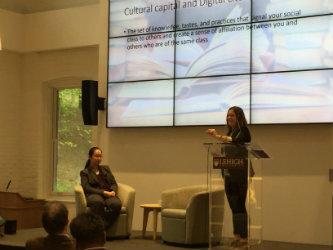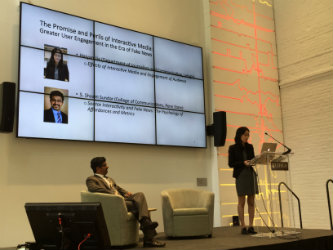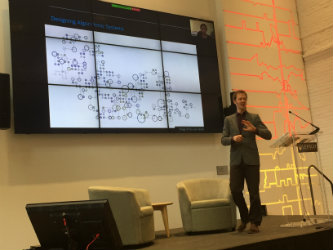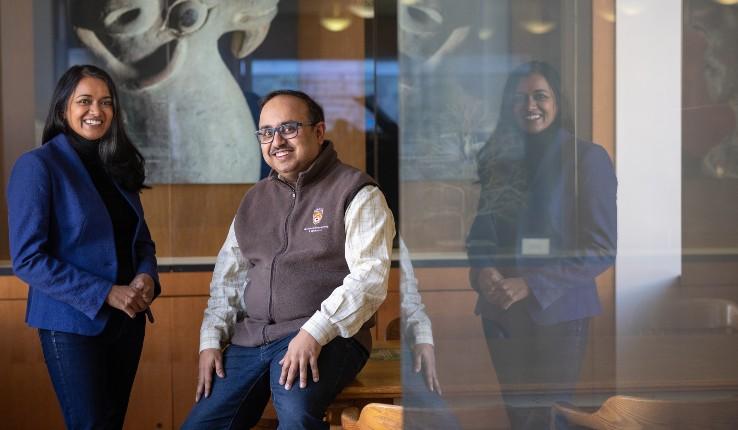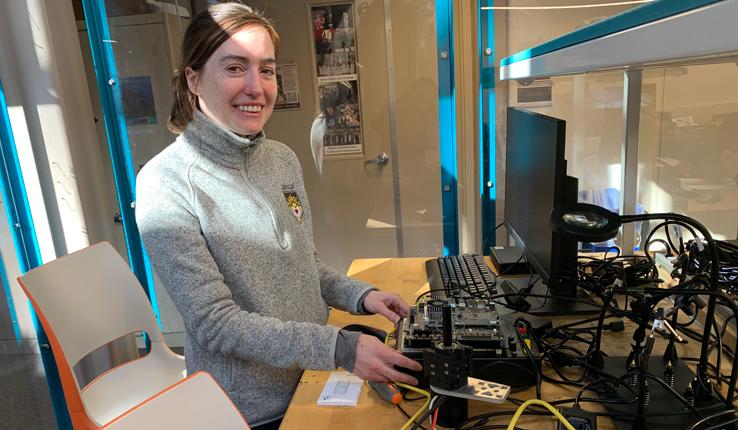Data X Symposium Examines the Impact of Digital Information
The ever-increasing availability of digital information has far-reaching consequences. At last week’s Data X Symposium, three new faculty members, each hired through Lehigh’s Data X Initiative, explored these consequences in the areas of marketing, communication and computer science. They were joined by colleagues from Northwestern University, Penn State and the University of Illinois Urbana-Champaign, who gave complementary presentations.
“Journalism, news, information, social media: the lines are now permanently blurred in ways that shake the foundation of our society,” said Daniel Lopresti, professor and chair of computer science and engineering and director of the Data X Initiative, in his introduction. “Technology powerhouses like Facebook and Google are scrambling to find ways of advancing the artificial intelligence they deploy to cope with the massive amounts of information that flow through their systems, which is far too great a task for humans to manage unaided.”
The May 3 symposium, titled “Found and Lost in Information: Perspectives from Marketing, Communication and Computer Science,” was held in the Roemmele Global Commons in Williams Hall. It featured three 50-minute sessions divided into two presentations each:
- “The Bright and Dark Sides of Social Media and Digital Marketing,” presented by Rebecca Wang, assistant professor of marketing at Lehigh, and Ashlee Humphreys, an associate professor at the Medill School of Journalism, Media, and Integrated Marketing Communication at Northwestern University
- “The Promise and Perils of Interactive Media: Greater User Engagement in the Era of Fake News,” presented by Haiyan Jia, assistant professor of journalism and communication at Lehigh, and S. Shyam Sundar, distinguished professor and founder and co-director of the Media Effects Research Laboratory at Penn State
- “Algorithms and their Interpretation: Designing around Mis/Alignments,” presented by Eric P.S. Baumer, assistant professor of computer science and engineering at Lehigh, and Karrie Karahalios, associate professor of computer science at the University of Illinois Urbana-Champaign.
Each presenter discussed his or her own research and perspective on the topic, and each presentation was followed by a question-and-answer session.
“Having scholars from other institutions share their work and thoughts is always inspirational,” said Wang. “Ashlee [Humphreys] and I have been collaborators since I was a doctoral candidate [at Northwestern], and I was so fortunate to be able to invite her to come visit Lehigh. By design, our presentations complement each other’s, and I am so glad she was able to share her current and latest work on digital literacy and digital satisfaction with our community.”
The symposium, said Lopresti, was tremendously interdisciplinary, spanning the College of Business and Economics, the P.C. Rossin College of Engineering and Applied Science, and the College of Arts and Sciences.
“I realize we think this [interdisciplinarity] is a special thing at Lehigh, but often we use that term to describe overlap between two fields that are really quite close, or we use it purely in the context of undergraduate education,” Lopresti said. “What we saw [at the symposium] was noteworthy in that it demonstrated incredibly strong overlap in the area of faculty scholarship—not just teaching—across three different fields in three separate colleges that have traditionally been considered very distinct.”
Jia appreciated the opportunity to discuss the topic of digital information with researchers from other disciplines.
“From a communication perspective, source credibility has long been investigated; however, the advancement and the wide spread of communication technology further complicates credibility judgment, a phenomenon that has drawn much attention in the past year or so,” said Jia.
“Behind the phenomenon of misinformation and misalignment of content in online information processing lie not only the communication factors that influence individual psychology and cognition, but also the driving force of marketing strategies and the technical underpinning of algorithms. The Data X Symposium provided an unique opportunity to address this issue with an interdisciplinary approach that allows a conversation among researchers across these fields.”
Current events reinforce the importance of the symposium topic, said Lopresti.
“We began initial planning for this symposium in the fall, before the U.S. Presidential election. The relevance and significance of the topics we'll hear about today seem to increase by leaps and bounds with each passing moment. I think we chose very well when we did our early planning,” he said.
“An annual mini-conference such as the Data X Symposium really helps showcase and nurture our unique, interdisciplinary approach to research and pedagogy that fits well with Lehigh’s culture,” said Wang. “This year’s symposium, in particular, was a timely one in light of recent news such as misinformation and YouTube’s advertising controversies.
“I also think the symposium can potentially spur collaborations among faculty members as well as demonstrate Lehigh’s strengths to outside communities. Perhaps even more importantly, it helps us engage with our students outside the classroom, and hopefully it inspires them to think outside the box and prompt them to start learning about, analyzing and solving real-world issues using a data-driven mindset and knowledge from different disciplines.”
Posted on:


